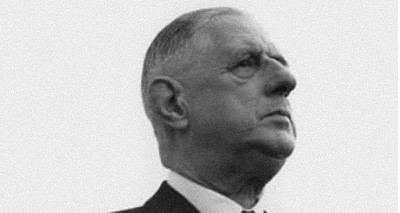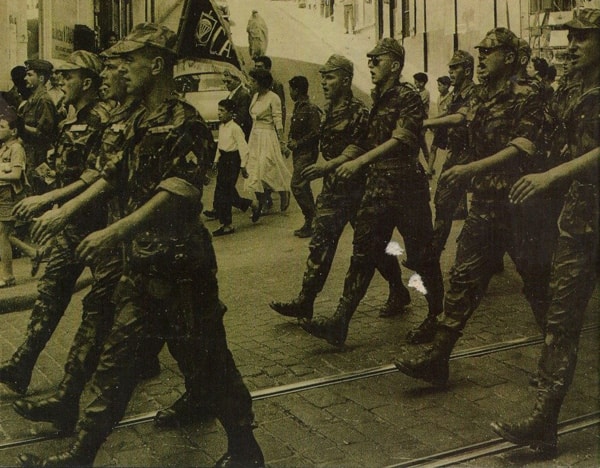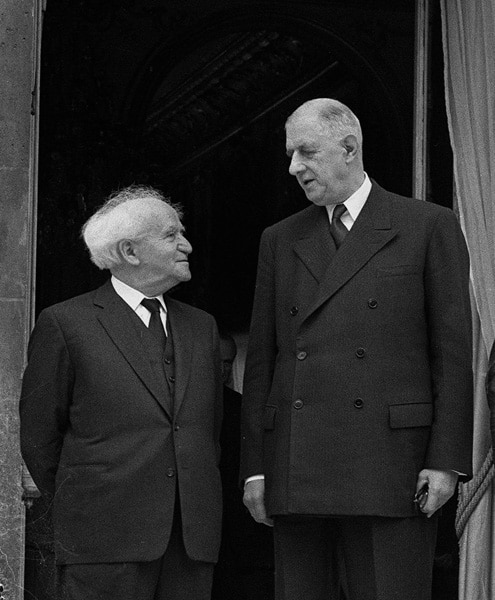A ‘French Israel?’
Guillaume Durocher, American Renaissance, May 15, 2020

As men have known since as least the time of Aristotle, a lack of common identity is a source of tension. The French learned this harsh truth in 1954, when the Muslim Front de Libération Nationale (FLN) launched a military and terrorist uprising in Algeria.
Algeria was not just a French colony; it was three French départements (counties) that were legally part of the republic. One million European settlers, known as pieds-noirs,[1] lived in Algeria as French citizens, in often tense coexistence with 10 million disenfranchised Muslims, mostly Arabs and Berbers.
Successive French governments had struggled to govern Algeria. To put down the 1954 rebellion, France sent half a million soldiers, including conscripts and elite paratroopers (Jean-Marie le Pen, who later founded the National Front, was one of those paratroopers). The soldiers were largely successful in putting down the rebellion, but the cost in men, money, and world opinion grew increasingly heavy. No one knew how to placate both the Muslims and the Europeans. In 1958, and after a settler-supported coup by the French Army in Algeria, Charles de Gaulle came to power in France as seemingly the only man who could control the situation.

French paratroopers marching in the streets of the Casbah, Algiers’ Arab quarter, 1957.
French governments had promised that in the long run, Muslims would be “integrated,” meaning they would become French citizens, with social security and the right to vote. De Gaulle was skeptical. The cost of providing poor Muslims with welfare would be enormous, and the prospect of hundreds of Muslim deputies in the National Assembly, or even of a Muslim in the presidential Élysée Palace, struck him as absurd. The 10 million Muslims would, he warned, soon multiply to 30 million, and there were only 45 million people in France.
De Gaulle was an identitarian. If Arabs and Muslims became a significant part of the population, De Gaulle knew that “France would no longer be France. We are still primarily a European people of white race, Greek and Latin culture, and Christian religion.”[2] While individuals of other races could assimilate, whole populations could not.
In October 1959, De Gaulle told MP Alain Peyrefitte: “We cannot bear this population which is as prolific as rabbits and these huge territories. Emancipating them is a good deal.”[3] France absolutely had to free itself from this “burden” (boulet).
Full Algerian independence would leave the Europeans at the mercy of the Muslim majority, but there was an alternative: partition into two territories, one majority European and the other majority Muslim. This had often been proposed.

The “Hersant Plan” to split Algeria into a French province and two Muslim republics.
In July 1961 De Gaulle asked Peyrefitte to promote partition. He told him:
The important thing for a minority, you understand, is to be the majority somewhere. If the ethnic French [Français de souche[4]] were the majority in Oranie and in the Mitidja Plain up to Algiers, they would be masters of the land. No one could object to this, so long as the Muslim population is left free to organize itself as it wishes beyond the redoubt where we would gather. The French Canadians are the majority in Quebec; there, they were able to exist, were able to defend themselves. In the other provinces, where they are the minority, they are drowned, crushed. The pieds-noirs, and the Muslims who wish to stay with them, could hold in this redoubt. The two million Israelis have been able to hold in the face of the 100 million Arabs who surround them.[5]
Peyrefitte published articles in favor of partition, wrote a book on the subject, and sold the idea to newspapermen and politicians.
De Gaulle’s own commitment to the idea was unclear. Was this a serious plan or just a way to put pressure on the FLN rebels so he could put conditions on Algerian independence? De Gaulle wanted guarantees for the European population and access to the Sahara, which besides oil and natural gas, was the testing ground for France’s atomic weapons.
In December 1961, Peyrefitte presented De Gaulle with his partition plan, which included:
- Gathering the Europeans, and any Muslims who had sided with the French or wished to stay with them, in a strip of territory in the western part of the country, from the cities of Algiers to Oran.
- Transferring other Muslims to the rest of Algeria, under FLN rule.
- Continued French access to the Sahara, which would be an autonomous territory.
- Possible Arab/European partition of Algiers, not unlike divided Jerusalem or Berlin.
De Gaulle’s reaction:
In short, you want to create a French Israel. This is what [Israeli prime minister David] Ben Gurion pushed me to do, when he came to visit me. But he warned me: “It will work only if you send more French settlers en masse, to live there permanently, and if they sign up to fight as soldiers.” Imagine that! The pieds-noirs want our army to defend them, but they have never felt the need to defend themselves![6]

Charles de Gaulle with David Ben Gurion, June 1960
Peyrefitte had two different possibilities in mind. One would be “a French-Muslim Lebanon,” an independent Algeria of ethnically-homogeneous cantons. The other would be division into separate states.
De Gaulle continued: “We could try all of that, perhaps, if I had ten years ahead of me.[7] But time is short. This has dragged on for too long. I have tried everything, everything! We need to put an end to this.”[8] For three years, the general had pushed several options — some conciliatory others military — without good results.
He went on:
We will not put our national destiny on hold for the sake of the moods of the pieds-noirs! If we follow your solution, the whole world will stand against us. The Third World will be in solidarity with the Arabs. We will have created a new Israel. All the hearts, in the Arab world, in Asia, in Latin America, will beat together with the Algerians. The Jews had a good reason: They have their roots in that land, long before the Arabs and they have no other national home. In Algeria, the Arabs came first; everything that we have done carries the stain of the colonial regime; France is the national home of the French of Algeria. Believe me, this solution [of yours] would be unworthy of France. It is not in line with her long-term interests. We need to unload this burden from our shoulders. It is exhausting us. . . .
And as for me, do you think it is with a joyous heart that I would [abandon those who believed in us]? I, who was raised in the religion of the flag, of French Algeria and French Africa, of the Army as the guarantor of the Empire? Can you not see this is an ordeal? Can you not see that it is dreadful for me to withdraw our colors from wherever we are in the world?[9]
Peyrefitte was disappointed that all his work in favor of partition had been pointless. Prime Minister Michel Debré consoled him: “Partition was initially one of the General’s basic ideas [idées de fond]; then, as is often the case, he gave up on the idea as such, but continued to pursue it as a tactical means.”[10]
In the event, De Gaulle opted for Algerian independence. This led to a traumatic and terroristic civil war among the French, the Army, and the European settlers, culminating in the chaotic exile of the one million Europeans of Algeria. De Gaulle had thought only 10 or 20 percent of the settlers would flee an independent Algeria. The real number was closer to 95 percent.
De Gaulle did not, as far as I know, take any significant action to prevent African and Muslim immigration to France. This is all the more striking in that, in June 1945, then-Prime Minister de Gaulle issued directives to institute a more “Nordic” immigration policy to promote Scandinavian and even German immigrants.
What if De Gaulle had chosen to keep French Algeria and grant French citizenship to the natives? This is what the French have done in other overseas departments, such as Martinique, Guadeloupe, and Guiana, which have large black and mixed-raced populations. These people have French passports and can live in France, so Algerians could have done the same. On the other hand, French administration in Algeria probably would have improved the economy, thus reducing pressure for Muslims to emigrate.
What if De Gaulle had partitioned Algeria, as Peyrefitte suggested? It would probably have led to permanent conflict as in Northern Ireland, Israel-Palestine, or Kashmir. Third-World resentment would have spoiled De Gaulle’s dream of a French foreign policy of “grandeur,” leading a bloc of countries independent of the American and Soviet superpowers.
On the other hand, a “French Israel” might have given France — or at least Frenchmen with a thirst for heroism — a chance to maintain a fighting spirit. In France, whatever was left of the spirit of authority, discipline, and heroism dissolved under De Gaulle’s presidency, culminating in the student uprising of May ’68.
Israel’s colonization of Palestine and perpetual struggle with the Arabs has led to an extraordinary fighting spirit among Israeli Jews. Jews, with the help of Zionist lobbies that ensure support from the West, have maintained their patriotism, their armed forced, and even birth rates above those of the Arabs. One of the ironies of history is that Adolf Hitler appears to have hoped occupation and semi-permanent warfare in Eastern Europe would have a similar effect on Germans.
This is a consideration for Europeans all around the world who are thinking about how to disentangle themselves from other peoples. Secession is increasingly attractive, particularly in the United States of America.
The case of De Gaulle and Algeria shows how a European population’s interests can be sacrificed to advance the interests of the state. It also shows how much political elites resist partition, and that even conservative leaders with healthy instincts and an understanding of demographic realities may fail to take far-sighted action. When the time comes, we must be in a position to give them no choice.
* * *
[1] A term meaning “black feet,” possibly referring to the leather shoes worn by Europeans.
[2] Quoted in Alain Peyrefitte, C’était de Gaulle, (Paris: Gallimard, 2002), p. 66.
[3] Ibid., p. 73.
[4] “Français de souche” can be more literally translated as “French by origin.” In fact, many of the European settlers in Algeria were not French, but from Spain or Italy, or from the periphery of the French territories in Alsace-Lorraine or Corsica. This implies that to be a truly assimilated Frenchman, need simply be white and not necessarily of French origin.
[5] Quoted in Peyrefitte, C’était de Gaulle, p. 91-92.
[6] Ibid., p. 99.
[7] De Gaulle was 71 years old.
[8] Peyrefitte, C’était de Gaulle, p. 102.
[9] Ibid., p. 103-4.
[10] Ibid., p. 104.















